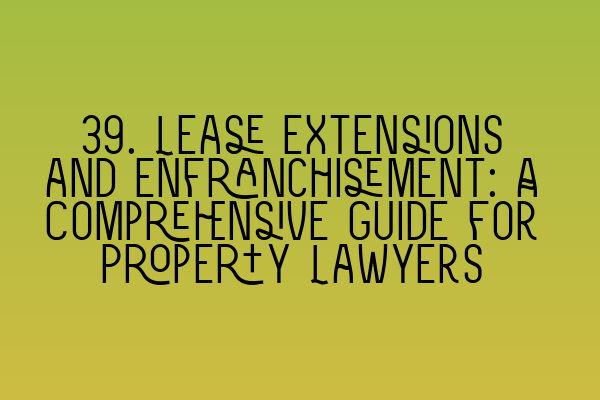39. Lease Extensions and Enfranchisement: A Comprehensive Guide for Property Lawyers
As a property lawyer, understanding lease extensions and enfranchisement is crucial in providing expert advice to clients and ensuring smooth transactions. This comprehensive guide will outline the key concepts, processes, and considerations involved in lease extensions and enfranchisement, equipping you with the knowledge and expertise necessary to navigate these complex areas of property law.
1. Understanding Lease Extensions
Lease extensions play a vital role in ensuring the long-term value and marketability of leasehold properties. As a property lawyer, you must be well-versed in the legal framework governing lease extensions and the rights and responsibilities of all parties involved.
A lease extension grants the leaseholder the right to extend the lease term beyond its original expiry date. This is particularly relevant for residential leasehold properties, where leases typically have a fixed term of 99 or 125 years.
When advising clients on lease extensions, you must consider various factors, including the remaining term of the lease, the potential cost implications for the leaseholder, and the impact on the freeholder’s interests.
Key considerations in lease extension matters may include:
- Evaluating the leaseholder’s eligibility for a lease extension
- Calculating the premium payable for the lease extension
- Dealing with contentious lease extension negotiations
- Complying with statutory procedures and time limits
It’s important to stay updated on recent legislative changes and case law that may impact lease extension processes and outcomes. Familiarity with relevant statutes, such as the Leasehold Reform, Housing and Urban Development Act 1993, and the Commonhold and Leasehold Reform Act 2002, is essential.
If you’re new to property law or want to brush up on your knowledge of the SQE (Solicitors Qualifying Examination) syllabus, consider enrolling in SQE preparation courses offered by reputable providers like FQ Property Services. These courses can help you refine your understanding of essential property law topics and prepare for the solicitors qualification exams.
To test your knowledge and enhance your preparation further, you can also explore practice exam questions and mock exams, such as SQE 1 Practice Exam Questions and SQE 1 Practice Mocks FLK1 FLK2.
2. Enfranchisement: Empowering Leaseholders
Enfranchisement is another significant aspect of property law that property lawyers must be well-versed in. Enfranchisement allows leaseholders to collectively purchase the freehold or acquire extended lease terms, granting them greater control over their property and reducing their dependency on freeholders.
The right to enfranchise is primarily governed by the Leasehold Reform, Housing and Urban Development Act 1993. This legislation sets out the criteria for exercising the right to enfranchise, procedures for collective enfranchisement, and mechanisms for calculating the price payable by the leaseholders.
As a property lawyer, you may be involved in a wide range of enfranchisement matters, including:
- Advising leaseholders on their enfranchisement rights
- Assisting with the formation of enfranchisement companies
- Negotiating terms with freeholders
- Calculating the valuation of the freehold or extended lease terms
Understanding the intricacies of enfranchisement procedures is crucial to ensure the smooth progression of these transactions. Familiarize yourself with the relevant legislation and keep abreast of any updates or significant judicial decisions that may impact enfranchisement matters.
To enhance your understanding of relevant property law topics and prepare for the SQE exams, taking SQE 2 Preparation Courses, offered by leading providers such as FQ Property Services, is highly recommended.
3. Key Considerations for Property Lawyers
When dealing with lease extensions and enfranchisement matters, it’s essential to keep in mind several key considerations that can affect your clients’ interests and the overall success of the transaction.
Firstly, communication and negotiation skills are paramount in ensuring successful lease extension and enfranchisement transactions. As a property lawyer, you must effectively communicate with clients, freeholders, and other parties involved in the process to find mutually agreeable terms and resolve any disputes that may arise.
Secondly, attention to detail is critical when reviewing lease agreements, conducting valuations, and advising on the legal aspects of lease extensions and enfranchisements. Failing to identify crucial clauses or provisions within lease agreements can have significant financial and legal consequences for your clients.
Lastly, staying updated on changes in property law, such as legislative amendments and case law developments, is vital to providing accurate and up-to-date advice to clients. This includes being aware of SRA SQE Exam Dates and being well-prepared for the solicitors qualifying exams.
Conclusion
Lease extensions and enfranchisement are complex areas of property law that require expertise and a thorough understanding of the legal framework governing these transactions. As a property lawyer, staying updated on legislative changes, familiarizing yourself with relevant statutes, and being well-prepared for SQE exams are all essential steps towards providing exceptional service to your clients.
Enroll in SQE preparation courses, such as those offered by FQ Property Services, to enhance your knowledge and skills in property law and stay ahead in your professional journey.
Remember to check out related articles for additional resources:
